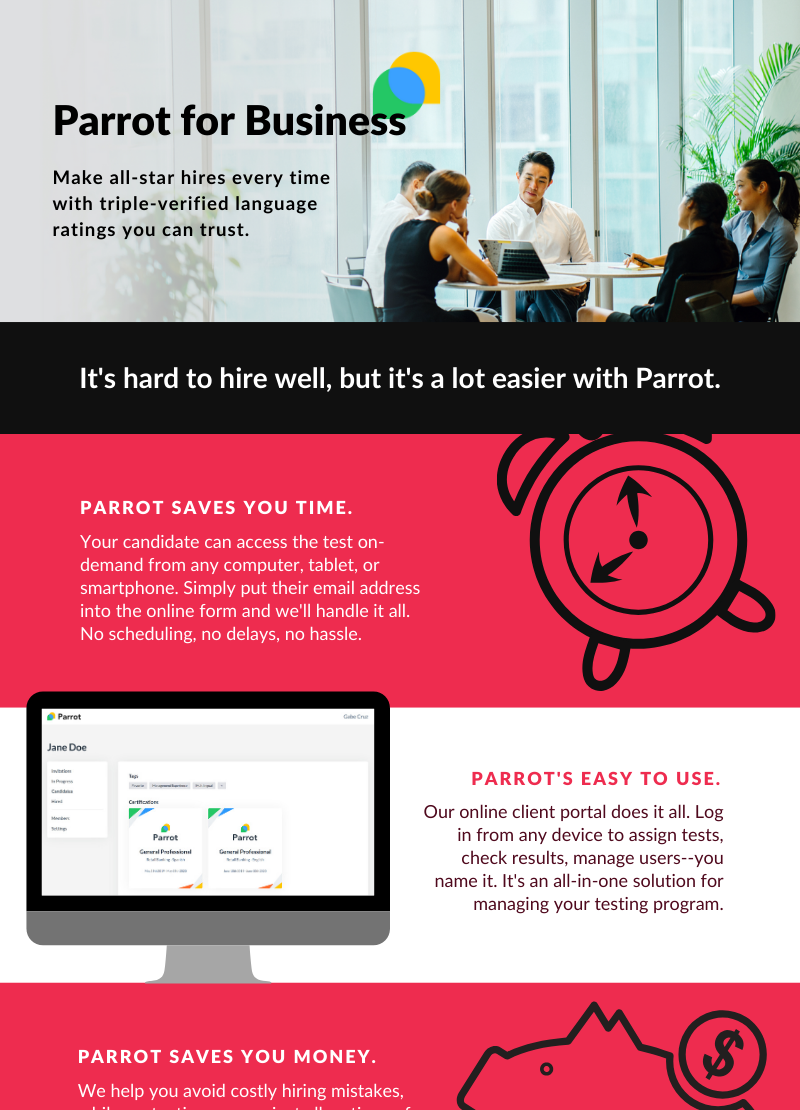How Much Does It Cost to Become a Certified Medical Interpreter?
Becoming a certified medical interpreter might be a challenging process, but it’s well worth it. If you are bilingual and have a knack for interpreting, this path is rewarding. Take the Parrot Language Test at $37 and enroll yourself for the 40-hour training to be eligible for a CCHI or NBCMI certification. The certification cost from either organization is the same, whereas the requirements to apply are different.
Let’s take a deeper dive into the criteria and the cost of getting certified.
NBCMI Certification
The National Board of Certification For Medical Interpreters (NBCMI)
The organization currently offers the Certified Medical Interpreter credential in six languages; Spanish, Cantonese, Mandarin, Russian, Korean, and Vietnamese. If the language you need is not available, NBCMI offers a HUB- CMI certification, indicating that the candidate has met all prerequisites, passed the written test, and is qualified to take the oral examination once available in that language.
Application: You will be required to submit the prerequisite documents as part of the application form. For the same, a non-refundable registration fee of $35 is applicable, which is valid for a year.
Written Exam: If the board approves the application, candidates can take the written test (year-round), irrespective of their language preference. The written test costs $175. Registration for the test should be done within six months from the date of approval.
Oral Exam: To earn the CMI certification, you must take an oral test in one of the available languages(Spanish, Cantonese, Mandarin, Russian, Korean, and Vietnamese). The cost is $275, and the exam can be taken year-round. The candidate has up to 2 years to pass the oral exam for the CMI credential. It’s worth noting that the Hub-CMI certificate expires in 2 years with no option for renewal.
For details, check out the NBCMI Certification Handbook.
CCHI Certification
Certification Commission For Healthcare Interpreters
CCHI is the only organization that certifies healthcare interpreters to receive NCCA accreditation for its certification programs. Certification through the NCCA serves as the standard for many allied health and medical professions in the United States. The organization offers two types of certification with different language offerings; CHI Certification and CoreCHI certification.
The CHI Certification is available for Arabic, Mandarin, and Spanish medical interpreters only. This requires both a written knowledge exam and an oral performance exam. If the target language is other than the ones listed, the candidate can become CoreCHI Certified.
CCHI Certification Cost: An application fee of $ 35 is to be paid while submitting the required documents. Once the application is approved, applicants need to register for the CoreCHI written exam by paying a $175 fee. Effective January 15th, 2021, the CoreCHI exam can be taken online. For Spanish, Arabic, and Mandarin, the candidates must take the CHI oral exam before becoming CHI Certified. The oral exam costs $275.
For the CoreCHI Certification, candidates need to pay the initial application fee followed by the written exam fee. An oral examination is not applicable here. Check out the CCHI certification cost and other details here.
Certification Cost & Other Details
Does the cost vary for different types of medical professionals? Does the price change from state to state?
Medical Interpreting certification from CCHI and NBCMI remain the same across the US and Canada. They are standard for all medical specialties. The certification’s core purpose is to offer a national professional standard to all healthcare interpreters. Therefore the medical interpreter certification cost is the same across the United States.

Additional Resources

Parrot for Business Info Sheet
We built Parrot to help businesses hire candidates with the language skills those businesses need to grow. Read this info sheet to learn more about how easy your testing program could be.
Test Quality & Validity
By combining an innovative methodology with modern tech, we’re creating a new standard for evaluating language skills. However, none of that would matter if our results weren’t also unquestionably valid. This report shows how we’ve fine-tuned our method to meet and exceed key industry standards for validity.


